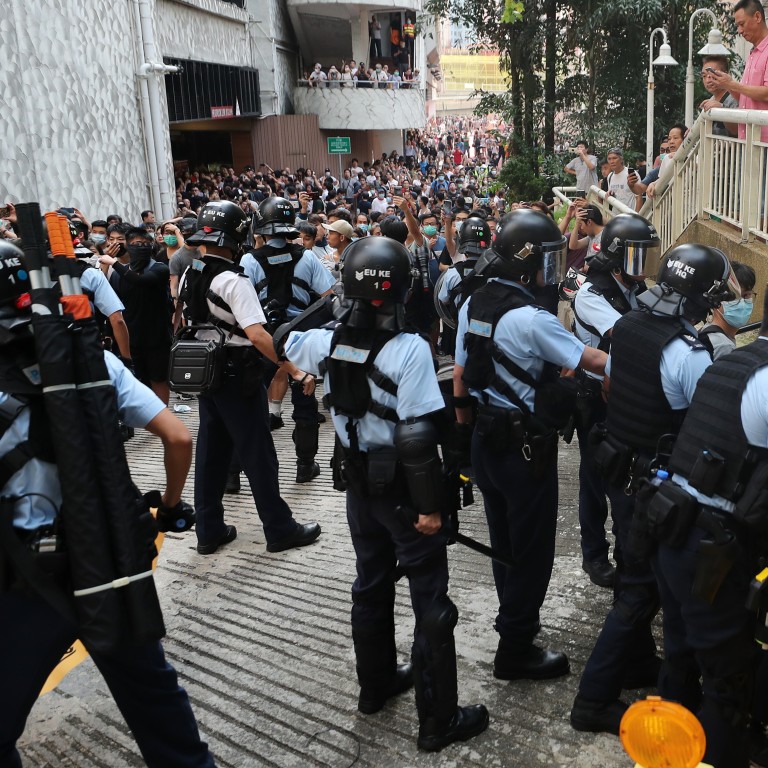
Hong Kong protests: spotlight on judge for ordering removal of yellow masks in court and riot comments on reporters – was he right, or did he go too far?
- Mixed views over actions by Judge Ernest Lin, who was hearing case on four protesters, with some saying he had the power to uphold dignity of court, while critics argue he infringed on freedoms
- Lin also accused of stirring debate on official accreditation for journalists after he criticised reporters in yellow vests shown in court video
The drama unfolded in courtroom 7 of the District Court during a session on Monday presided over by Judge Ernest Lin Kam-hung, who was hearing the guilty pleas of four suspects involved in an illegal assembly.
During a follow-up sentencing session on Wednesday, Lin sought to clarify his stance, saying the yellow masks also carried “political demands”.
At least one of three people involved in the mask saga on Monday was seen wearing a face covering with the acronym “FDNOL”, said to refer to the protest slogan “Five demands, not one less”, a clarion call for the 2019 anti-government movement. Under internal police guidelines, the phrase has been deemed a possible breach of the Beijing-imposed national security law.
Lin said on Wednesday his order against the masks was not about their colour or to pass judgment on a particular political belief, or exclude anyone from the court on such basis.
“I saw members of the public inside the courtroom wear yellow masks with political demands printed on them. I do not want the court to become a venue for expressing political demands, so I instructed my clerk to urge them to change their masks,” the judge said, adding the ban could allow him to focus on the legal issues at hand.
While some argued the judge had an inherent power to uphold the dignity of his court as he saw fit – and ban silent or covert protests of a political nature – others called for such power to be exercised proportionately. Even when political expression was involved, they said, courts should not bar attendees so long as they were not disruptive.
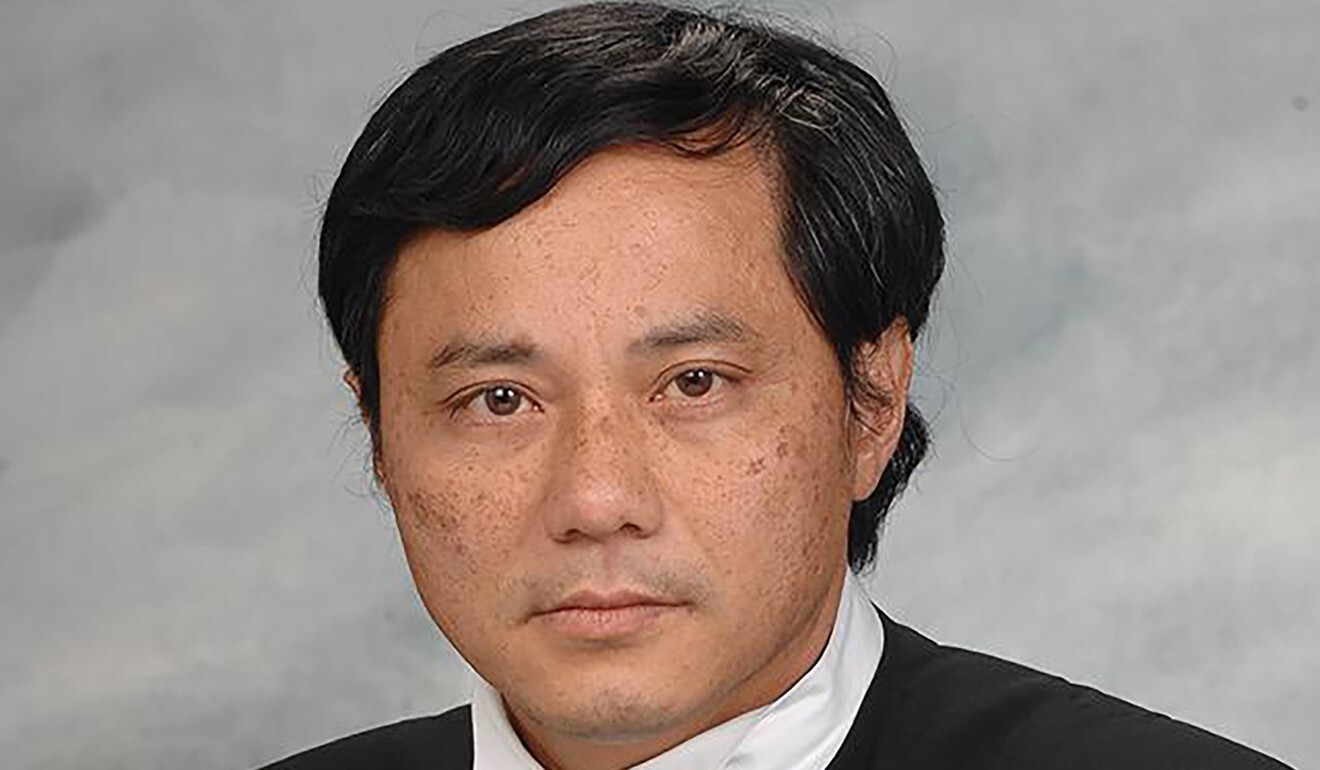
Remarks Lin made on the sidelines of the case also raised the ire of journalist groups. He had accused reporters of also protesting while the court was viewing video footage submitted by prosecutors. Lin alleged people wearing yellow vests – whom he believed were the press – had “constituted a part of the riot” by “standing there” and “preventing the victims from leaving”.
A media scholar said the comment would only renew calls from police and the pro-establishment camp for an accreditation system for the city’s news media, although the chairman of the city’s biggest journalists’ body warned that the judge was trampling on press freedom.
Hong Kong chief justice defends judges, judicial independence in inaugural speech
The controversy emerged during Monday’s hearing when Lin was dealing with four men who pleaded guilty to taking part in an unlawful assembly inside Amoy Plaza on September 14, 2019, when three shoppers were attacked by protesters. But it was the judge’s supplementary comments and decision on the masks which drew public scrutiny.
During the course of the proceedings, Lin gestured to his clerk to approach him. Shortly afterwards, the clerk invited a lawyer of one of the defendants to leave the courtroom, while another court staff member asked two others from the public gallery to be excused. The pair later said they were the defendants’ relatives.
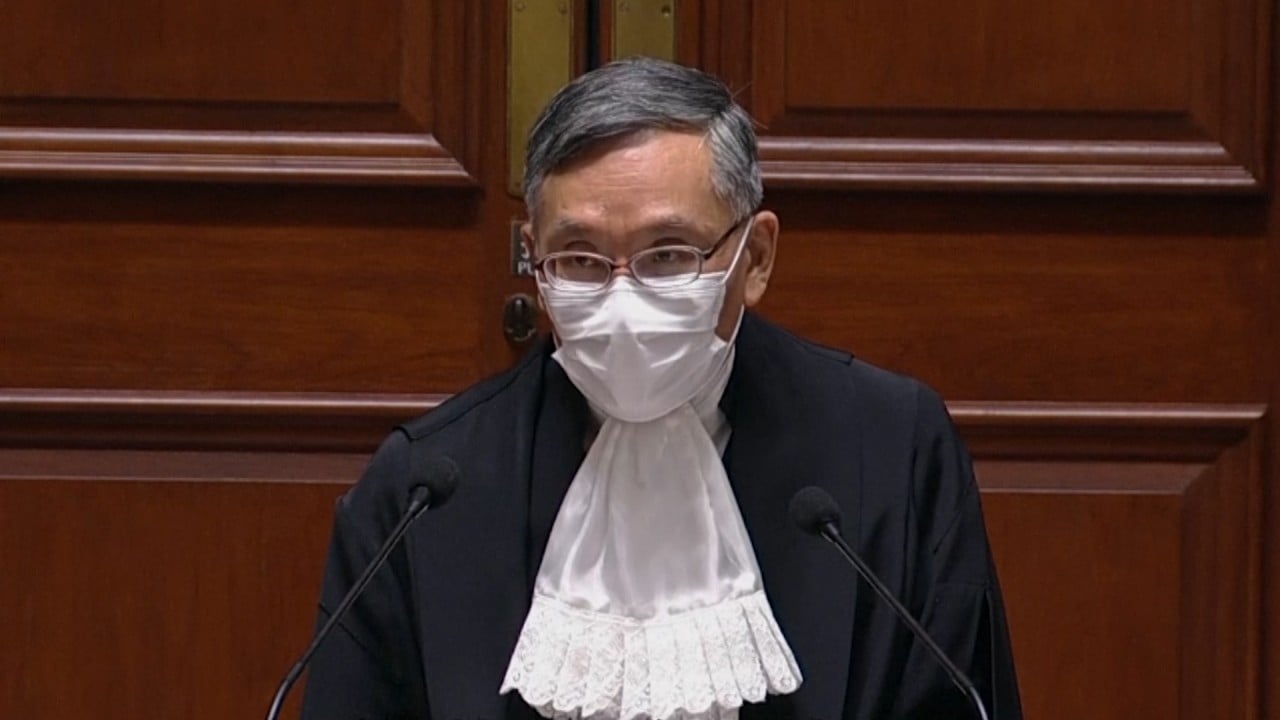
01:04
Hong Kong’s new chief justice pushes back at attacks on judges
All three were wearing bright yellow masks at the time, and they were told to replace those with coverings of a different colour, with no reason given. The particular hue prompted many to speculate the fuss was over its association with protesters’ adopted colour.
Before the start of Wednesday’s hearing, Lin’s clerk told attendees to replace their masks if they were yellow in colour and printed with words. Those who refused would be invited to watch the live broadcast of the proceeding in another courtroom, the clerk added.
On Lin’s earlier order, former director of public prosecutions Grenville Cross said: “It is well established that a judge has an inherent power to uphold the dignity of his or her court, and Judge Lin has apparently exercised this.”
He said the power included “preserving the court’s decorum” and making sure that the courtroom was not to be used by any to make a political gesture, however covert.
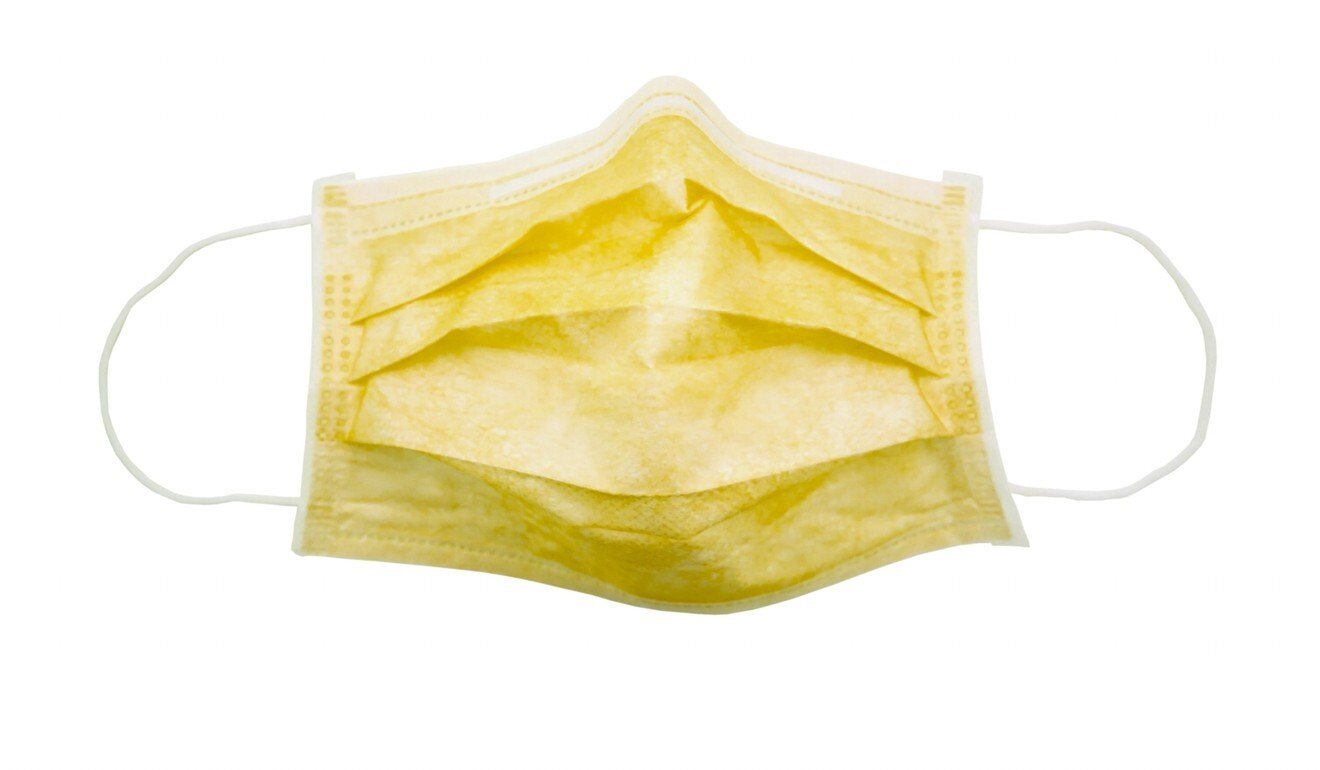
“It is disproportionate, in my view, to require these individuals to cease their peaceful, non-disruptive, silent political expression,” said the scholar, calling the decision “off the cuff” and “precarious”.
“Be it a transparent [mask] or one with floral patterns, Hong Kong is a free society and I think there is absolutely no problem in it,” Cheung said.
Commenting on Lin’s criticism of reporters in yellow vests, Peter Kwan Wai, a journalism professor at the Chu Hai College of Higher Education, said the judge could have been lamenting the lack of proper credentials or identification system for media outlets.
A similar call had been made previously by the pro-establishment camp, which accused some journalists of standing in the way of police at protests. Police had also argued that some people were masquerading as reporters at demonstrations, and the force has since put in place a system in which journalists and agencies have to be recognised.
Two plead guilty over airport riot, four to illegal assembly at shopping centre
Kwan added that such an accreditation system was also present in the United States, where he worked as a journalist.
Hong Kong Journalists Association chairman Chris Yeung Kin-hing warned an official system could curtail press freedom and the right of the public to have access to information.
“If you have an official accreditation, who decides who gets the credential and who doesn’t?” he said.
He added such a far-reaching decision should not be decided based solely on a judge’s comment made over a video clip, with no consideration for the context on the ground.
University of Hong Kong principal law lecturer Eric Cheung Tat-ming said a judge was entitled to make observations based on the evidence given. But Lin’s words uttered under such circumstances would have no bearing or legal implications on the people identified, unless police and prosecutors decided to pursue them, according to Cheung.
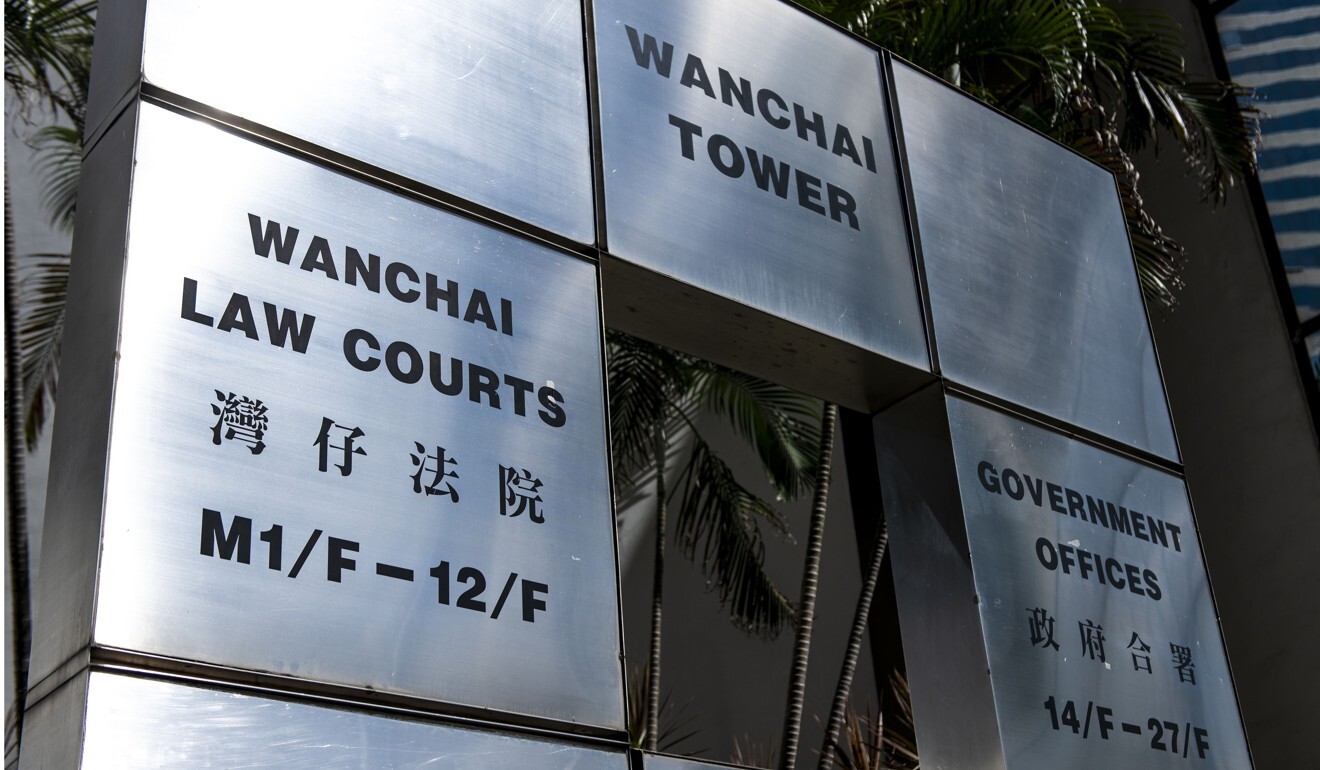
He noted, however, that Lin’s move appeared to contradict advice the chief justice would later give to judges during his inauguration speech soon after the hearing on Monday.
“When dealing with high-profile cases or cases with a political flavour, judges must be particularly careful with their appearance of impartiality in terms of what they say in court or write in their judgments, or how they treat the parties, their lawyers or the witnesses,” Cheung had said.
“Any lapses in this regard, given the potentially polarising nature of these cases, could lead to suspicion of partiality, which is not conducive to maintaining public confidence in our judicial system.”
Editor’s note: this story has been updated to reflect latest statements and developments

